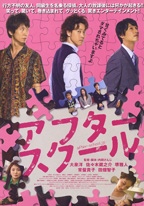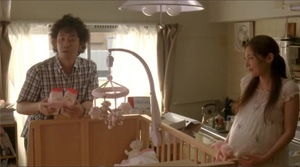

Afuta Sukuru
Japan 2008
Genre:
Crime, Comedy
Director:
Kenji Uchida
Cast:
Yo Oizumi
Kuranosuke Sasaki
Masato Sakai
Takako Tokiwa
Tomoko Tabata
Toshiyuki Kitami
Masato Ibu
Kei Yamamoto

After School
Story: Jinno (Yo Oizumi) is a teacher and a good friend of Kimura (Masato Sakai), who one day doesn't return home. Neither Jinno nor
Kimura's wife (Takako Tokiwa) think much of it since it isn't the first time that his work prevents him from coming home. However, suddenly private eye
Shimazaki (Kuranosuke Sasaki) turns up at Jinno's workplace and asks him several questions. Before realizing it Jinno is himself investigating the case.
Shimazaki has a picture that shows Kimura with another woman (Tomoko Tabata). It turns out that this woman has worked at a hostel club of a yakuza boss
(Masato Ibu) and has disappeared as well. The private eye still owes that very yakuza boss some money. After further investigation it turns out that
the yakuza boss is doing some shady business with Shimazaki's employer (Toshiyuki Kitami). This employer is also the boss of the company Kimura works for.
The connections are lying just in front of the investigator, but how exactly the different puzzle pieces fit together isn't clear. As if a certain
piece was still missing...
Review: How much are you allowed to and how much should you spoil of a story when writing a review? A difficult question, especially in the
case of "After School". What at first seems like a simple detective story which centers around a possible affair more and more comes apart until at a certain
point the whole film falls apart and needs to be put together completely from scratch. That is an impressive effort by screenwriter (and director) Kenji Uchida,
but this imaginativeness has also a few unpleasant side effects. Consequently, the characters remain very intransparent and most of all lifeless. The reason
for that is comprehensible, but this doesn't help when it comes to becoming emotionally enganged by the events on screen. In fact, this even makes this crime
movie rather tiresome.

So what's so special about "After School"? Pretty simple: Nothing in this movie is the way it seems at first. That sounds really good and you can certainly tell
that Kenji has put a lot of effort into his screenplay, but it also results in the individuals all wearing masks. And maybe even another mask over that one.
If the surroundings of the characters are supposed to be deceived the audience needs to be led up the garden path as well, particularly if a well done
twist is the goal. Still, this also means that you never know what you actually have in front of you. What ultimately defines the individual we believed to
know? For what reasons should we care about his/her fate? This is one of the movie's big problems because at the end we hardly care what happens
to whom.

Kuranosuke Sasaki ("Train Man") plays the detective who seems to be the most honest one of the bunch. However, he also lacks some
real character traits. At least his motives are clear from the get-go. Jinno on the other hand is someone whose actions we can't comprehend at first.
Obviously he wants to help his friend Kimura, but something is just off. The same goes for Kimura. When it's finally time for the resolution your eyes will
pop out of your head. Because everything suddenly needs to be viewed in a completely different light. This new information might be occasionally hinted at,
which makes a second viewing probably very rewarding, but you are just caught completely off-guard by the resolution. You also shouldn't expect to understand
all of the background information right away.
Even though the second half is mainly focused on putting the movie and every subplot in a new light it's still very difficult to grasp every single fact
in its completeness. You are simply overwhelmed. making it difficult to put the different parties in some sort of relation, especially since they constantly
wear a mask in order to deceive us. Despite this fact the rough sketch of the actual events that took place should be pretty clear. To grasp the details (just
wait for the credits to roll) you have to review the movie before your inner eye, though. For some viewers this might be frustrating, even the more since, as
already said, you get the feeling that you can only understand certain aspects by viewing the film a second time. Nonetheless, Kenji Uchida deserves some
words of praise for his ambitious screenplay.

Contrary to his later work "Key of Life" this crime movie lacks humor, though. It should have been a constant element in the film, as is proven during some scenes, but it only remains a side note. "After School" also gives off a certain coldness not only through its impenetrable characters, but also its complete lack of a unique soundtrack. During one dialogue the director summarizes his message pretty clearly. If we always get to know only a small part of an individual, can we really say that we know that individual? Kenji Uchida has molded this realization into a decent thriller, which should especially please fans of big twists. Sadly, the film lacks the warmth of some believable characters.

Disclaimer

















